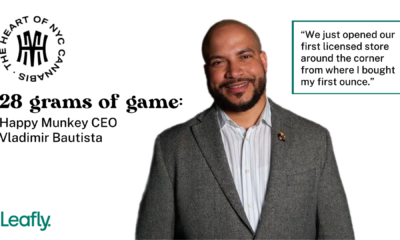Cannabis News
Pot Makes You a Better Parent is 100% a Real Thing According to a New Study on Affirmative Parenting Behaviors
Published
6 months agoon
By
admin

Pot is good for parents new study finds
Cannabis and parenthood: two concepts that have long been considered incompatible. For decades, the prevailing wisdom suggested that responsible parenting and marijuana use were mutually exclusive. This belief, deeply ingrained in our societal fabric, has led to countless families being torn apart, with children removed from their homes due to their parents’ cannabis consumption. The war on drugs, at its peak, painted a grim picture of neglectful, intoxicated parents unable to care for their children properly.
But what if we’ve been wrong all along? What if, like peanut butter and jelly, cannabis and parenthood actually complement each other in ways we never imagined? A groundbreaking new study, funded by the Centers for Disease Control and Prevention, suggests exactly that. The research, published in the journal Parenting: Science and Practice, offers compelling evidence that cannabis use might actually enhance positive parenting behaviors.
This revelation challenges long-held assumptions and forces us to reconsider our approach to cannabis in the context of family life. It seems that the leaf we’ve long demonized might actually be a tool for nurturing healthier parent-child relationships. But before we all rush to light up in the name of better parenting, it’s crucial to understand the nuances of these findings.
In today’s article, we’re going to take a deep dive into this fascinating research. We’ll explore what it truly means to be a “pot parent” in light of this new data. We’ll examine the potential benefits of cannabis use in parenting, but we’ll also look at where the line is drawn – when does cannabis consumption stop being helpful and start becoming counterproductive?
Most importantly, we’ll discuss how these findings might be applied practically to raise healthy, well-adjusted children. Can cannabis, used responsibly, actually make us better parents? It’s time to set aside our preconceptions and let the data speak for itself. Join us as we explore this paradigm-shifting research and its implications for families everywhere.
JG
Now write 500-words on, “Let’s review the study”
In this segment focus on:
-
The most important points the study found, both positive and negative.
-
Provide actual quotes from the study
-
Provide statistics and discuss methodology of the study
-
Talk about the sample group size
-
Talk about how this should alter our understanding of pot and parenthood
Let’s review the study
This groundbreaking research, funded by the Centers for Disease Control and Prevention, offers a fresh perspective on the relationship between cannabis use and parenting behaviors. Let’s dive into the key findings, methodology, and implications of this study.
The researchers analyzed survey responses from 77 parents recruited at Sacramento area cannabis retailers. This sample group, while relatively small, provided rich data through a comprehensive survey process. Participants completed a baseline survey, followed by five brief surveys per day for 14 days, and a final survey on day 15. This ecological momentary assessment (EMA) approach allowed for real-time data collection, capturing the nuances of daily life more accurately than retrospective surveys.
One of the most striking findings was the positive correlation between cannabis use and affirmative parenting behaviors. The study reports, “Parents had greater odds of using positive parenting during the same and subsequent time periods when using cannabis.” This challenges the long-held assumption that cannabis use necessarily leads to neglectful parenting.
Importantly, the research also found that parents were generally responsible in their consumption habits. The study notes, “Parents reported that children were not present in 92.3% of the episodes when they reported using cannabis.” This statistic suggests that most cannabis-using parents are conscientious about separating their use from direct childcare responsibilities.
The social context of cannabis use emerged as a significant factor influencing parenting behaviors. The researchers found that “Using cannabis with an individual for whom the parent may only have weak social connections to (compared to using alone) is the only social context in which a parent is more likely to use aggressive discipline.” This highlights the importance of a supportive social environment for cannabis-using parents.
On the positive side, the study revealed that parents who used cannabis with a spouse, partner, or friends “had higher odds of reporting positive parenting in the next time period.” This suggests that cannabis use in a supportive social context might actually enhance positive parenting behaviors.
The method of consumption also played a role in parenting outcomes. Parents who reported vaping marijuana “had lower odds…of using aggressive discipline in the time frame after use.” This finding could have implications for harm reduction strategies in cannabis-using parents.
It’s crucial to note the study’s limitations. The sample size of 77 parents is relatively small and not representative of all cannabis-using parents. The authors caution that their findings should be interpreted carefully, stating, “Much more needs to be understood around the social mechanisms that result in these findings to better understand how the social context of cannabis use may promote positive parenting.”
Despite these limitations, this study challenges our understanding of cannabis and parenthood in significant ways. It suggests that responsible cannabis use, particularly in supportive social contexts, may actually promote positive parenting behaviors. This flies in the face of decades of anti-drug messaging that portrayed any cannabis use as inherently detrimental to family life.
However, it’s equally important to note that the study doesn’t give carte blanche to unrestricted cannabis use by parents. The finding that parents overwhelmingly use cannabis when children are not present underscores the importance of responsible consumption habits.
This research should prompt a reevaluation of policies and attitudes towards cannabis-using parents. It suggests that blanket prohibitions or punitive measures against parents who use cannabis may be misguided and potentially harmful to families. Instead, a more nuanced approach that recognizes the potential benefits of responsible use while still prioritizing child welfare may be more appropriate.
As a father of a 3-year-old toddler and a 3-month-old baby, I can attest to the extreme stress that comes with parenthood. It’s a relentless rollercoaster of joy, exhaustion, and constant vigilance. The demands are never-ending – from middle-of-the-night feedings to toddler tantrums, there’s rarely a moment to catch your breath. You don’t get time to sleep or even take a peaceful bathroom break, as you’re always prioritizing your children’s needs over your own.
While I can’t speak for all parents worldwide, I can share my personal experience. When I’m done with work for the day and it’s time to engage with my kids, I’ve found that a single hit or two of cannabis can work wonders. It’s not about getting high or escaping reality; rather, it’s about shifting my perspective and allowing me to immerse myself more freely in their world.
Instead of feeling overwhelmed by the prospect of building yet another block tower or reading “The Very Hungry Caterpillar” for the hundredth time, cannabis helps me get out of my own way. It allows me to approach these activities with renewed enthusiasm and creativity. I’m no longer avoiding my kids’ play but actively participating in it. And let’s remember, play is how children learn and develop. When a parent fully engages in this play, it becomes even more enriching for the child.
Don’t get me wrong – parenting is still stressful, even with cannabis. But it definitely helps me relate to my children’s problems more empathetically. It opens me up emotionally, making me more attuned to their needs. I find myself more patient, more willing to get down on their level and see the world through their eyes.
In fact, I’d go so far as to say that for some parents, cannabis should be mandatory – especially those who often find themselves too busy or distracted to truly engage with their kids. Of course, I’m being a bit tongue-in-cheek here, but there’s a kernel of truth to it. If cannabis can help parents be more present, more patient, and more engaged, isn’t that a net positive for the family unit?
Now, I’m not advocating for irresponsible use. As the study showed, most cannabis-using parents are conscientious about when and where they consume. It’s about finding that sweet spot where you can enhance your parenting skills without compromising your ability to care for your children.
While there’s undoubtedly more research to be done on this subject, this study is a crucial step in challenging our preconceived notions about cannabis and parenting. For too long, we’ve operated under the assumption that any cannabis use automatically makes someone a “bad” parent. But reality, as always, is far more nuanced.
My experience, backed up by this research, suggests that responsible cannabis use can actually enhance positive parenting behaviors. It can help us slow down, be more present, and connect with our children on a deeper level. In the high-stress world of modern parenting, isn’t that something we should be exploring further rather than dismissing out of hand?
As we move forward, it’s crucial that we continue to reevaluate our attitudes towards cannabis and parenthood. We need to let go of outdated stigmas and instead focus on what actually benefits families. If cannabis, used responsibly, can help create more engaged, patient, and emotionally available parents, then perhaps it’s time we start seeing it as a potential parenting ally rather than an enemy.
CANNABIS MOMS AND THE SILENT WAR AGAINST THEM, READ ON…
You may like
-


The Best Tips To Update Your Wardrobe
-


Former New York Knick Iman Shumpert debuts ‘TSA Approved’ legal cannabis brand
-


How New York pot pioneers made it to legal dispensary shelves
-


Scientists Now Think That One Compound in the Cannabis Plant Can Replace All Opiates
-


Vladimir Bautista is leading Happy Munkey’s legacy-to-legal takeover
-


Cannabis Can Help A Sore Throat
Cannabis News
Scientists Now Think That One Compound in the Cannabis Plant Can Replace All Opiates
Published
6 hours agoon
April 3, 2025By
admin

Which Cannabis Compound Do Scientists Think Can Replace Opiates?
…And Why This Is Important
Opiates are a type of pharmaceutical drug that’s been made from the opium poppy plant. While it’s somewhat a ‘natural’ substance that’s been extracted from the fibers and sap of the opium poppy plant, these are extremely dangerous sedatives that act on the central nervous system. However, there are completely synthetic opioids as well, which are manufactured entirely in laboratories.
Famous examples of well-known and widely-used opiates today include heroin, codeine, and morphine. They all work similarly, binding to the brain’s opioid receptors and users feel a drastic reduction in pain. It also causes users to feel euphoric, drowsy, or sleepy. Common side effects include constipation and nausea.
Because opiates are powerful for dulling one’s pain perceptions, they have become commonly prescribed by doctors and hospitals for pain relief. That said, opiates have become one of the world’s most addictive, dangerous, and fatal drugs – and you can get prescribed it right by your very own physician. Repeated use of opiates can easily lead to dependence and addiction, and eventually consuming high doses can drastically slow down breathing, and cause brain damage, or even death.
Since doctors still keep prescribing opioids, this has resulted in the deadly Opioid Epidemic, which has killed thousands of people. It’s a worrisome public health crisis, most especially because of fentanyl, an illegally manufactured opioid which is said to be 50 times more potent than heroin.
Could The Answer To The Opioid Epidemic Lie In Cannabis…Terpenes?
The past few years have shown that cannabis legalization is critical for surviving the opioid epidemic, and reducing overall opioid consumption.
The results of a recent research paper, which builds on past studies conducted by Dr. John Streicher, who is a member of the Comprehensive Center for Pain and Addiction, reveals fascinating findings. According to Streicher, cannabis terpenes were found to provide relief in inflammation models as well as on neuropathic pain caused by chemotherapy.
For the study, Streicher and his research team analyzed 4 kinds of terpenes that are found in mid to high levels in Cannabis sativa plants: linalool, geraniol, beta-caryophyllene, and alpha-humulene. They discovered that each terpene produced significant pain relief among mice subjects with fibromyalgia and post-operative pain, and among the terpenes, geraniol was found to be the most powerful.
“Our research is showing that terpenes are not a good option for reducing acute pain resulting from an injury, such as stubbing your toe or touching a hot stove; however, we are seeing significant reductions in pain when terpenes are used for chronic or pathological pain,” he said. “This study was the first to investigate the impact of terpenes in preclinical models of fibromyalgia and post-operative pain and expand the scope of potential pain-relieving treatments using terpenes,” Streicher said.
Cannabis terpenes are the compounds responsible for the aromatic profile of each strain; they are located in the plant trichomes. Not only do they contribute to each strain’s unique flavor and odor, but they also have valuable therapeutic and medicinal benefits. There are around 150 kinds of terpenes known today, though in the entire plant world, there are known to be some 20,000 terpenes.
Understanding the therapeutic benefits of terpenes is incredibly valuable also because they don’t contain THC (tetrahydrocannabinol), the compound in marijuana that gets you high.
“With fibromyalgia, there isn’t much of an understanding of what the pain state is, and there are not a lot of great options for treating it,” explains Streicher. “Our findings show that terpenes may be a viable treatment option for fibromyalgia pain, which could potentially have a large impact and make a difference for an under-treated population.”
Other Studies
This is not the first time that cannabis terpenes have been found to demonstrate excellent pain-relieving properties. It must be noted that just like what Streicher says, terpenes seem to do better with chronic pain management, instead of acute pain management.
Another study from 2024, which was published in The Journal of the Association for the Study of Pain, was conducted by researchers at the University of Arizona and the National Institutes of Health. The investigators analyzed the analgesic properties of different terpenes including geraniol, humulene, linalool, pinene, and caryophyllene among mice subjects with chemotherapy-induced peripheral neuropathy.
According to the researchers, all the terpenes delivered analgesic effects that were equivalent to around 10 mg/kg of morphine. It was also interesting to note that administering both morphine and terpenes together at low doses resulted in ‘enhanced’ pain-killing effects.
“Together these studies identify cannabis terpenes as potential therapeutics for chronic neuropathic pain,” said the investigators.
There have also been other studies that have found that combining cannabis with opioids can indeed provide long-lasting pain relief. It comes with the added benefit of reducing opioid doses needed for effective pain control. This phenomenon is called opioid-sparing. These types of protocols can be beneficial for patients who suffer from severe, chronic pain caused by cancer, arthritis, joint problems, fibromyalgia, diabetes, post-surgical pain, migraines, nerve damage, and so much more.
Conclusion
Learning more about the pain-killing properties of terpenes is extremely valuable for the medical community, patients, and even society as a whole. We can all do with less opioid addictions because it has torn families apart, and caused the deaths of thousands of people.
Terpenes, or cannabis in general, offer a natural and safe alternative that can be complementary to other pharmaceutical treatments designed to reduce pain.
SWAPPNG OPIOIDS FOR CANNABIS, READ ON…


Cannabis and the Authoritarian State
Cannabis has been legal for longer than it has been illegal. Let that sink in for a minute. For thousands of years, humans cultivated and consumed cannabis freely across civilizations and continents. It wasn’t until the early 1900s that we witnessed a massive push to drive hemp and cannabis into the black market, primarily due to industrial competition from petrochemicals, pharmaceuticals, and other industrial applications.
What makes cannabis so threatening to powerful interests? For starters, hemp and cannabis are highly versatile crops with over 50,000 different uses, from medicine to textiles to fuel. Even more remarkable is how this plant is hardwired to work with the human body through our endocannabinoid system—a biological network we didn’t even discover until the 1990s.
Perhaps most threatening of all is that cannabis is insanely easy to grow. This means that if the plant helps you with a particular physical ailment, you have the ability to grow your own medicine indefinitely. No insurance premiums, no wait lists, no pharmaceutical middlemen—just you cultivating your own healing directly from the earth.
Authoritarians do not like this, not one bit. When people can meet their own needs independently, power structures lose their grip. When citizens can think differently without permission, control systems begin to fail. So today, we’re going to look at the interesting relationship between authoritarianism and cannabis, and how this humble plant plays a key role in keeping you free.
We’ve already established the versatility of cannabis, but there’s another element that those old D.A.R.E. PSAs inadvertently reveal about what authoritarians think about cannabis. I’m talking, of course, about “behavior.” You see, in an authoritarian system, you and I are but cogs in the machine. We’re the expendables who should be proud to work ourselves to death for our “fearless leaders.”
This is precisely why certain ideas, philosophies, religions, movements, books, and substances are typically banned in authoritarian regimes. Take North Korea as an example: everything from the type of television citizens watch to the music they hear is a tightly spun spell designed to keep the populace in check. While they don’t have explicit laws against hemp (they actually grow it industrially), smoking psychoactive cannabis is strictly forbidden.
Contrast this with places like Malaysia, where you can get up to 5 years for possessing just 20 grams of cannabis, and even face the death penalty depending on the situation. These authoritarians don’t play around when it comes to cannabis because they know it affects the behavior of their populace in ways they can’t control.
The question becomes: what behavior do they fear so much that cannabis produces within the individual?
The answer is a critical mind. People who consume cannabis often begin to question their own belief systems. Most regular users undergo some transformation in their values and perspectives. Cannabis has a unique way of helping people see beyond cultural programming and think outside established paradigms. It can make the familiar strange and the strange familiar—a psychological state that’s antithetical to authoritarian control.
This independent thinking runs counter to the narrative of authoritarians who wish to maintain a tight grip on social consciousness. If even 10% of a population begins to pivot in their behavior within a regime, it can have massive ripple effects. Just look at cannabis in the US—it went from being demonized to being embraced by the majority in less than 80 years, despite massive propaganda efforts.
For authoritarians, psychoactive cannabis isn’t primarily a threat to public health and wellbeing—it’s a threat to the health and wellbeing of authoritarianism itself. When people start thinking differently, they start living differently. When they start living differently, they start demanding different. And that’s the beginning of the end for any system built on unquestioning obedience.
Beyond the threat to thought control, there’s another reason why drugs in general remain illegal: the state can use prohibition as a weapon against the populace. This isn’t conspiracy theory—it’s documented history.
Take Nixon’s war on drugs. His domestic policy chief, John Ehrlichman, later admitted: “We knew we couldn’t make it illegal to be either against the war or black, but by getting the public to associate the hippies with marijuana and blacks with heroin, and then criminalizing both heavily, we could disrupt those communities.” Nixon essentially placed cannabis on the Controlled Substances Act because he needed an excuse to shut down anti-war protests and target Black communities.
Since hippies and anti-war protesters were smoking “freedom grass,” making it illegal would circumvent their freedom of speech and freedom of assembly, and more importantly—turn free citizens into state property. It’s a win-win if you’re an authoritarian looking to silence dissent.
Then there’s the whole “boogeyman” complex that prohibition creates. We’re told “drug dealers” are roaming the streets preying on innocents, giving them “marihuanas” so they can do vile things. What the government conveniently leaves out is how the banks these “dealers” use to launder their money remain untouched. They don’t mention the shadier dealings of law enforcement either—like running guns into Mexico (eventually leading to the death of one of their own), or spraying poison on crops, killing and hospitalizing people because, you know…”Drugs are bad!”
Authoritarians cannot let go of the value that keeping the most widely used illicit substance in the world illegal provides them. This explains why the US hasn’t federally legalized cannabis despite nearly 80% of Americans supporting some form of legalization. It’s not because they don’t have enough research or that they’re genuinely concerned about public health—it’s because prohibition gives them all the privileges of violating constitutional rights while siphoning money into their coffers.
Drug prohibition creates a perpetual enemy that can never be defeated, allowing endless justification for surveillance, militarized police, asset forfeiture, and expansion of state power. What authoritarian could resist such a convenient tool?
Cannabis is a plant. You can’t make nature illegal—it’s counter to the human experience. When governments attempt to criminalize a naturally occurring organism that humans have cultivated and used for thousands of years, they reveal the absurdity of their position and the limits of their authority.
While the United States isn’t a full-on authoritarian state (yet), the truth is that many authoritarian elements have played out over the years. You only need to look as far as the war on drugs to see how the state utilizes prohibition as a weapon to their advantage. From no-knock raids to civil asset forfeiture to mass incarceration, drug laws have erected a parallel legal system where constitutional protections often don’t apply.
The fundamental truth is that cannabis is not only versatile and medicinal, it gives you back your autonomy in multiple ways. It helps you think for yourself. It allows you to grow your own medicine. It connects you with a plant that humans have used ceremonially, medicinally, and industrially throughout our history. And this autonomy is something authoritarians cannot stand—free individuals who know how to think beyond the narratives they’re fed.
Cannabis doesn’t just get you high—it offers a perspective from which the absurdities of prohibition become glaringly obvious. Perhaps this is why, as state after state legalizes, we’re witnessing the slow but steady unraveling of one of the most enduring authoritarian policies in American history.
So if you count yourself among those who value freedom of thought and bodily autonomy, who believe that nature doesn’t require government permission, and who understand that true liberty includes the right to explore your own consciousness—well, maybe it’s time to toke one up for freedom!
LEGALIZING CANNABIS IS NOT ENOUGH, READ ON..
Cannabis News
Stop Using Bat Poop to Fertilize Your Weed Plants Immediately, Here is Why…
Published
2 days agoon
April 1, 2025By
admin

Don’t Fertilize Your Weed with Bat Poop
Fertilization is a critical step for growing healthy marijuana plants.
They help provide essential nutrients for marijuana in various stages of growth, while promoting plant growth. There are dozens of different fertilizers to choose from in the market; growers can choose based on budget, nutrients needed, location, season, and much more. But not all fertilizers are made equally – of course, some are of better quality than others.
That said, there are some rather unusual fertilizers that can be used on plants. These may include, but are not limited to: coffee, milk, grass clippings, banana peels, fish tank water, potato water, and even urine! Yes, it does sound strange, but to gardening enthusiasts, there is nutritional value to be found in each of these things, which can make them suitable fertilizers depending on the circumstances.
For example, grass clippings make excellent mulch and can provide potassium, nitrogen, and phosphorus. Urine is a potent source of nitrogen as well as phosphorus. Banana peels are rich in calcium, which is excellent for promoting root growth while helping supply oxygen to the soil.
But what about bat poop? Also known as guano, bat poop has been said to work as a plant fertilizer because it’s rich in nitrogen, potassium, phosphorus, and other nutrients. Unfortunately, using bat poop as a plant fertilizer can also be dangerous. So if you don’t really know what you are doing, bat poop as a fertilizer can be extremely risky.
Bat Poop Fertilizer Kills 2 NY Men
On December 2024, news of two men hailing from Rochester, New York, dying went viral.
The cause of death was dangerous fungus, in the bat poop that they were using to fertilize their marijuana plants. Both men grew their own marijuana plants for medical consumption, but unfortunately developed histoplasmosis after breathing toxic fungal spores from the guano.
One of the men was aged 59 years old; he bought bat poop online to use as fertilizer for his plants. Meanwhile, the other was a 64-year-old male who found guano in his attic, then decided to use it to fertilize his cannabis plants. They both developed similar symptoms, including chronic coughs, fever, severe weight loss, and respiratory failure. The case was also discussed in the Open Forum Infectious Diseases medical journal.
Is there a safe way to use bat poop as fertilizer? If you ask me, I truly can’t understand why one would use guano as fertilizer when there are so many other proven safe alternatives out there that are simply not as risky. According to the University of Washington, one must always wear a dust mask each time you open a bag containing soil amendments. That’s because a mask will greatly decrease the chances of breathing in fungal spores, which could be potentially dangerous. They also go on to explain that yes, guano is indeed used as fertilizer for its valuable nitrogen content but it still isn’t without its own risks, particularly of developing Histoplasma – the same condition that killed the two men.
Make Your Own Safe Fertilizers At Home
There are many other safe, affordable – and even free – fertilizers you can feed your marijuana plants with. It doesn’t have to cost a fortune nor does it have to be risky to your health.
Check out these easy, low-cost, DIY fertilizers for weed:
-
Coffee grounds are abundant in nitrogen, which makes it perfect for the vegetative stage of marijuana plants. They are also a fantastic source of organic materials and green waste, which contain other vital nutrients. When the coffee grounds decompose, they create soil aggregates that improve soil aeration and its water retention capabilities.
Mix around 2 grams of coffee ground for every liter of soil. Measuring its pH levels is also helpful, since you want it to be between 6 to 6.5
-
Crushed eggshells are a great way to ensure no eggshells go to waste. It’s rich in calcium plus other minerals that are effective in improving overall plant structure, health, and growth. In fact, so many gardeners and farmers commonly use crushed eggshells to help boost plant growth – and it will work just as well for marijuana plants.
They’re really easy to use, too! Just mix eggshells into the soil, or steep them into water then pour into the soil for a calcium-packed feed.
-
Banana tea or water is rich in potassium and magnesium, making it perfect as a feed during the marijuana plant’s flowering stage. You can use banana peels differently: with 3 to 5 banana peels, soak it in water for 2 days. Then you can use the water on your plants, and even leave the banana peels as compost for your garden.
-
Wood ash from your fireplace or other sources is a great source of phosphorus and potassium. Simply sprinkle some wood ash over marijuana during the final flower phase. Just use 1 or 2 grams of ash for every liter of substrate. Be careful not to use too much wood ash, or it can make the soil too alkaline.
-
Animal manure, such as those from cows, rabbits, or horses, make excellent organic fertilizers. Just be sure that they’re composed properly so that you avoid introducing weed seeds, or pathogens.
These low-cost fertilizers are also natural and effective. There’s no reason for you to turn to bat poop as fertilizer, even if you’re in a bind.
Conclusion
Guano or bat poop is a poor choice of fertilizer if you don’t know what you are doing. It’s risky and potentially dangerous – just not worth it. Instead, fertilize your marijuana plants with these options mentioned.
BEST POOP FOR CANNABIS PLANTS, KEEP READING…

The Best Tips To Update Your Wardrobe

Former New York Knick Iman Shumpert debuts ‘TSA Approved’ legal cannabis brand

How New York pot pioneers made it to legal dispensary shelves

Scientists Now Think That One Compound in the Cannabis Plant Can Replace All Opiates

Vladimir Bautista is leading Happy Munkey’s legacy-to-legal takeover

Cannabis Can Help A Sore Throat

Cannabis and the Authoritarian State

As cannabis consumer tastes evolve, industry must look beyond potency

Article: Early 2025 Empire State Psychedelic Policy Roundup

White House Finally Comments On Marijuana Industry

Distressed Cannabis Business Takeaways – Canna Law Blog™

United States: Alex Malyshev And Melinda Fellner Discuss The Intersection Of Tax And Cannabis In New Video Series – Part VI: Licensing (Video)

What you Need to Know

Drug Testing for Marijuana – The Joint Blog

NCIA Write About Their Equity Scholarship Program

It has been a wild news week – here’s how CBD and weed can help you relax

Cannabis, alcohol firm SNDL loses CA$372.4 million in 2022

A new April 20 cannabis contest includes a $40,000 purse

Your Go-To Source for Cannabis Logos and Designs

UArizona launches online cannabis compliance online course
Trending
-

 Cannabis News2 years ago
Cannabis News2 years agoDistressed Cannabis Business Takeaways – Canna Law Blog™
-

 One-Hit Wonders2 years ago
One-Hit Wonders2 years agoUnited States: Alex Malyshev And Melinda Fellner Discuss The Intersection Of Tax And Cannabis In New Video Series – Part VI: Licensing (Video)
-

 Cannabis 1012 years ago
Cannabis 1012 years agoWhat you Need to Know
-

 drug testing1 year ago
drug testing1 year agoDrug Testing for Marijuana – The Joint Blog
-

 Education2 years ago
Education2 years agoNCIA Write About Their Equity Scholarship Program
-

 Cannabis2 years ago
Cannabis2 years agoIt has been a wild news week – here’s how CBD and weed can help you relax
-

 Marijuana Business Daily2 years ago
Marijuana Business Daily2 years agoCannabis, alcohol firm SNDL loses CA$372.4 million in 2022
-

 California2 years ago
California2 years agoA new April 20 cannabis contest includes a $40,000 purse







